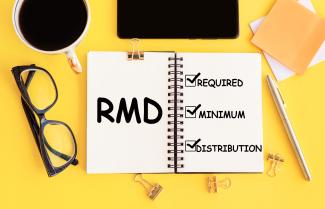
New IRA Rules
Hopefully if you are 73 or older you are in a position where you have so much money coming in that you don’t need to take any money from your retirement accounts. However the pesky IRS has been thirsty for that retirement money you have been deferring tax on for years and they are requiring you to take out what is called a required minimum distribution (RMD) from your traditional IRA, SEP-IRA, or SIMPLE IRA by April 1 of the year after you turn 72.
If you turn 73 this year, you can wait until April 1 of next year to take your first RMD—but you’ll also have to take your second RMD by the end of 2024 so you will double up your distribution.
Your RMD is a percentage of the total value of your retirement accounts based on your age and life expectancy. You can check out the table here. The older you are, the more you must take and subsequently pay tax. But here’s the kicker: your RMD must be based on the value of your retirement accounts as of the end of the prior year—December 31, 2022, in the case of 2023 RMDs. So you may have a high RMD even if your account value drops during the year.
If your retirement accounts consist primarily of stocks, bonds, or other securities, you don’t have to sell them at their current depressed levels and distribute the cash to yourself to fulfill your RMD. There’s another option: do an in-kind distribution.
With an in-kind RMD, you transfer stock, bonds, mutual funds, or other securities directly from your IRA to a taxable account, such as a brokerage account. No selling is involved. The amount of your RMD is the fair market value of the stock or other securities at the time of the transfer.
You will still have to pay income tax on the distribution at your current tax bracket. So you will have to come up with the cash to pay the tax from another source, such as a regular bank account.
With an in-kind distribution, not only do you avoid selling stocks in a down market, but the transfer may also reduce the taxes due on any future appreciation when you eventually do sell. This is because when you do an in-kind RMD, it resets the basis of the assets involved to their fair market value at the time of the transfer.
If you later sell, you pay tax only on the amount gained over your new basis. And such sales out of a taxable account generally are taxed at capital gains rates, not ordinary income rates.
For example, John is 75 years old and is in the 35% tax bracket. His RMD is slated to be $100K for 2023. He transfers ABC stock he bought 20 years ago for $30K that has now gone up to $100K, but was worth $120K before the market drop.
He owed $35K in taxes on the transfer(ouch) but his basis in ABC stock is now $100K. If he sells that stock in the future for more than $100K he will only pay tax on the gain over $100K.
If an in-kind distribution sounds attractive make sure you discuss with your custodian or advisor your objective so they can give you the proper steps to process it correctly.
Inherited IRAs
The IRS has finally clarified rules around inherited IRAs for non-spouse beneficiaries. In the past, non-spouse beneficiaries, who inherited IRAs had to take out a required minimum distribution(RMD) based on their life expectancy. This helped younger beneficiaries who only had to take very low withdrawals in the early years. Thanks to the Secure Act of 2019 the beneficiaries now had to deplete the account over a 10 year period instead of over their lifetime.
There was confusion however if withdrawals were supposed to be made every year along the 10 years or could withdrawals be made sporadically during the 10 years with the account going to $0 by the end of the 10th year. The IRS finally clarified that RMDs do have to be withdrawn every year. RMDs that are not taken will be subject to a tax penalty. If you inherited an IRA in 2020 or 2021 the penalty is waived but it will start in 2023. If you paid a penalty in one of those year you can request a refund for that penalty. The penalty for not taking the RMD has been reduced to 25% by Secure Act 2.0 that was just passed in December.

